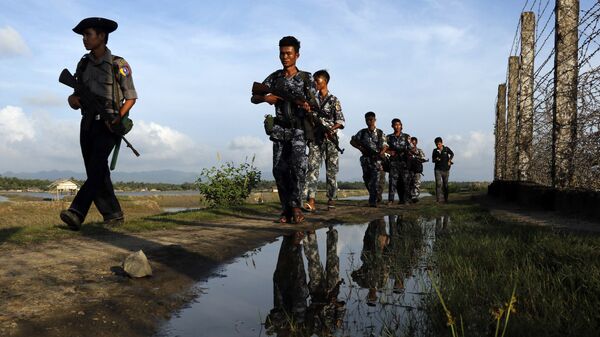China is seriously concerned about the possibility of Daesh's penetration into Myanmar and the Chinese province of Yunnan amid the ongoing Rohingya crisis in Rakhine State, a Chinese expert in international affairs told Sputnik China speaking on condition of anonymity.
According to the expert, radical Rohingya and Uighur Muslims may jump at the opportunity to establish contacts with Islamist forces in Southeast Asia. Over recent years, China has been constantly dealing serious blows to extremist Islamist groups inside the country, the source added.
"The crisis in Rakhine continues to escalate," the expert said. "It can lead to the merging of local extremists with terrorist forces in the Middle East. All these pose a huge challenge to Southeast Asia and China, therefore we must take preventive measures."
Beijing's concerns have geopolitical grounds, the expert noted, adding that after the National League for Democracy in Myanmar came to power, the country has embarked on a path of rapid development.
"We hope to maintain this trend, so China stresses the importance of stability and development of Myanmar," the source underscored.
"Myanmar is an alternative to the Straits of Malacca, being a very short way of transporting energy resources and other strategic products from the Indian Ocean to the southern provinces of China, primarily to Yunnan," he explained.
However, since traffic flows have become a geopolitical factor there are forces that are not interested in China getting the shortest route to the Indian Ocean, the Russian scholar highlighted, referring to the US — China's main economic and geopolitical rival.
According to Volkhonsky, Myanmar's destabilization plays directly into the hands of China's political opponents. He noted that it doesn't matter whether the conflict would be fanned on religious, ethnic or tribal grounds; the main objective of China's rivals is "to create a situation of the so-called controlled chaos."
He also called attention to media reports suggesting that US intelligence services could have had connections to Daesh. On September 7 a military source familiar with the matter told Sputnik about the alleged evacuation of Daesh field commanders by the US Air Force aircraft. According to Karen Kwiatkowski, a retired US Air Force Lieutenant Colonel turned anti-neoconservative activist, it could have been the CIA black ops looking to cover their trail after an operation.
When contacted by Sputnik, the Combined Joint Task Force of the Operation Inherent Resolve's press office has called the allegations "false."
To tackle the potential threat of the spread of terrorism Beijing has recently boosted its diplomatic and moral support to Myanmar's authorities.
Another sign of Beijing's support for Myanmar authorities was the World Conference of Businessmen of Chinese Origin that took place in Yangon on Saturday, bringing together over 2,000 prominent representatives of business circles of China and foreign countries.
Furthermore, Beijing has vowed to send urgent humanitarian aid for destitute Rohingya refugees to Bangladesh, along with Indonesia, Malaysia, Turkey and India.
For their part, Western countries have focused on the promotion of a campaign calling to deprive Aung San Sun Kyi the country's incumbent State Counsellor of the Nobel Peace Prize, which adds to the tension simmering in the state.
The Rohingya crisis erupted on August 25 when Muslim insurgents of Rohingya origin attacked security posts in Myanmar's Rakhine State. The tough response by the country's authorities triggered violent clashes. According to Reuters, more than 410,000 Rohingya Muslims have fled the country since the beginning of the crisis.
The conflict, which originally started about a century ago, has gradually escalated since 2011, hitting its peak in 2012 when thousands of Muslim families sought asylum in special refugee camps on the country's territory or fled to Bangladesh. Yet another escalation started in 2016.





